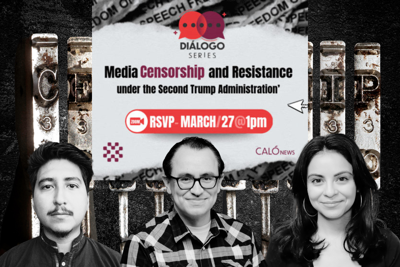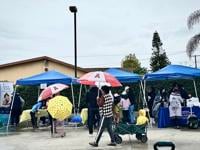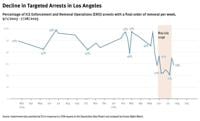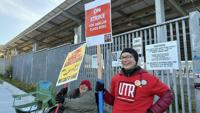
The Dialogo event will be held via Zoom and 1 p.m. PST. Photo courtesy of Biviana Carrillo
Media censorship, violations of the First Amendment and threats to freedom of the press are just a few of the topics that the 8th Diálogo session, taking place this Thursday, March 27th via Zoom, will touch on.
The Diálogo session titled “Voices Silenced: Media Censorship in the Second Trump Administration” will explore how Latino and Latinx newsrooms have been affected through rhetoric, policies and executive action before and since Donald Trump came to office for a second term.
The online event will feature a list of respected journalists, attorneys and media rights advocates who will share their personal and professional experiences, challenges and strategies for resistance when it comes to media censorship and democratic values of freedom of speech.
The Díalogo series was created by CALÓ News and the Latino Media Collaborative (LMC) as a space where community members, journalists, philanthropists, policymakers and medical leaders could convene to discuss and dialogue on the most pressing issues for Latinos.
This Diálogo, the first of 2025, will be moderated by the Los Angeles Times columnist Gustavo Arellano. Arellano, the former editor of OC Weekly, winner of the Los Angeles Press Club President’s Award, the Impacto Award from the National Hispanic Media Coalition and the 2023 Pulitzer Prize, will be moderate the conversation and panel discussion made up of representatives from various Latino-led SoCal media outlets.
Editors, journalists and media experts, including Jessica Gonzalez, Ben Camacho, Deborah Drooz and Michelle Zacarias will examine how censorship impacts both the creation and consumption of news and what role Latino newsrooms play in resisting this phenomenon while serving and ethically informing their communities.
Gonzalez will be representing Free Press, an organization focused on media advocacy issues, including saving net neutrality, achieving affordable internet access and uplifting the voices of people of color in the media. In her two decades in the field, she has advanced policy efforts at the intersection of media, tech, racial justice and democracy.
Camacho will also be one of the featured speakers at Thursday’s event. Camacho, a multi-award-winning investigative journalist and documentary photographer, has reported on state-sponsored violence and the communities impacted by it. He was sued twice by the City of Los Angeles in a failed effort to censor public records. He co-founded West Side Storytellers, a documentary production team whose flagship project received the Charles Rappleye Award from the Los Angeles Press Club. In 2023, he was named a Distinguished Journalist by the Society of Professional Journalists-LA.
Drooz, a renowned authority on defamation, entertainment and commercial litigation, will also be part of this month's Diálogo. She has successfully argued matters and obtained favorable litigation outcomes for public figures and corporate clients, including the Anschutz Entertainment Group, Berry Gordy, Aretha Franklin, Martha Stewart, David LaChapelle, Steve Wynn and others. Drooz is also an adjunct professor at Southwestern Law School and has written and lectured on topics relating to First Amendment litigation, entertainment industry litigation and rights of privacy and publicity.
Zacarias, a CALÓ News staff writer, will also participate in the panel discussion. The award-winning journalist is a 2023-25 UC Berkeley Local News Fellow. She formerly taught at USC’s Annenberg School for Communication and Journalism and currently resides in Southern California. Michelle is passionate about covering Latinx issues, anti-racism movements, queer identities, marginalized communities and abolition. She has previously written for Truthout, Prism, Latina Mag, New America and more. In 2018, Michelle was awarded the Saul Miller Excellence in Journalism Award for her contributions to the field.
The panel's collective insight will shed light on direct and indirect forms of censorship, including executive orders, social media policies and financial pressures on independent Latino media as well as the role of media in protecting civil rights and promoting the voice of marginalized communities.
The Diálogo is a free event and open to journalists, media professionals, activists, community members and anyone interested in understanding the implications of media censorship.
The event will be held via Zoom and 1 p.m. PST.
In order to RSVP and access the Zoom link, please visit https://www.latinomedia.org/rsvpdialogo.











(0) comments
Welcome to the discussion.
Log In
Keep it Clean. Please avoid obscene, vulgar, lewd, racist or sexually-oriented language.
PLEASE TURN OFF YOUR CAPS LOCK.
Don't Threaten. Threats of harming another person will not be tolerated.
Be Truthful. Don't knowingly lie about anyone or anything.
Be Nice. No racism, sexism or any sort of -ism that is degrading to another person.
Be Proactive. Use the 'Report' link on each comment to let us know of abusive posts.
Share with Us. We'd love to hear eyewitness accounts, the history behind an article.